People Management in NHS: Theoretical Models and Applications Report
VerifiedAdded on 2021/02/19
|10
|2652
|17
Report
AI Summary
This report provides an overview of people management within the National Health Service (NHS), focusing on key areas such as leadership, training and development, and talent management. It examines theoretical models relevant to these areas, including democratic leadership and hands-on training, and their application to the current NHS scenario. The report analyzes the priorities of NHS management and the role of the HR function in supporting these priorities, with a focus on education, training, employee retention, and attracting nurses back to practice. It also explores internal and external influences on leadership, training, and talent management, such as communication, organizational structure, technological changes, and competition. The report concludes with recommendations for the NHS, including improvements in organizational structure, grievance handling, and strategies to promote nursing courses and improve employee satisfaction.

INTRODUCTION TO
PEOPLE MANAGEMENT
PEOPLE MANAGEMENT
Paraphrase This Document
Need a fresh take? Get an instant paraphrase of this document with our AI Paraphraser
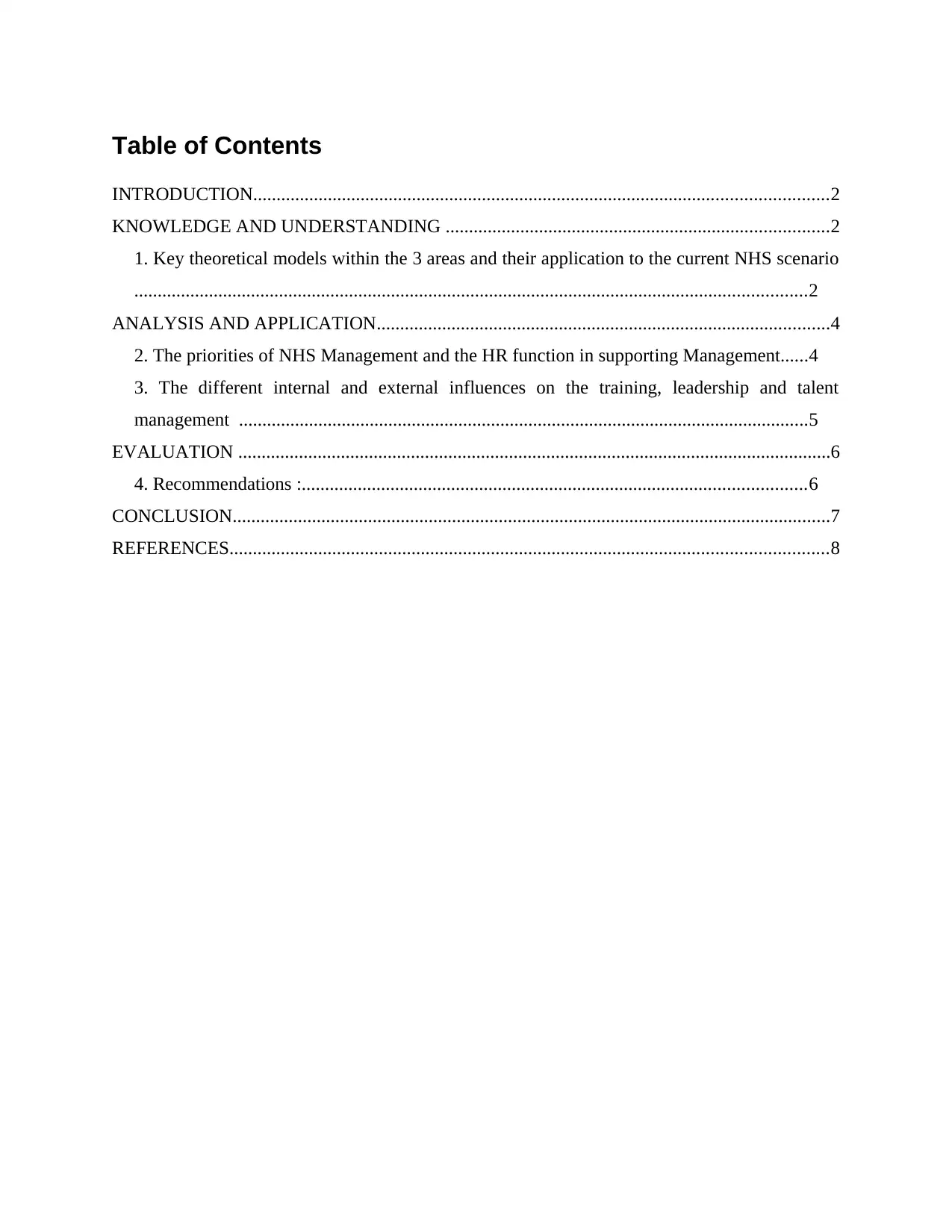
Table of Contents
INTRODUCTION...........................................................................................................................2
KNOWLEDGE AND UNDERSTANDING ..................................................................................2
1. Key theoretical models within the 3 areas and their application to the current NHS scenario
................................................................................................................................................2
ANALYSIS AND APPLICATION.................................................................................................4
2. The priorities of NHS Management and the HR function in supporting Management......4
3. The different internal and external influences on the training, leadership and talent
management ..........................................................................................................................5
EVALUATION ...............................................................................................................................6
4. Recommendations :............................................................................................................6
CONCLUSION................................................................................................................................7
REFERENCES................................................................................................................................8
INTRODUCTION...........................................................................................................................2
KNOWLEDGE AND UNDERSTANDING ..................................................................................2
1. Key theoretical models within the 3 areas and their application to the current NHS scenario
................................................................................................................................................2
ANALYSIS AND APPLICATION.................................................................................................4
2. The priorities of NHS Management and the HR function in supporting Management......4
3. The different internal and external influences on the training, leadership and talent
management ..........................................................................................................................5
EVALUATION ...............................................................................................................................6
4. Recommendations :............................................................................................................6
CONCLUSION................................................................................................................................7
REFERENCES................................................................................................................................8
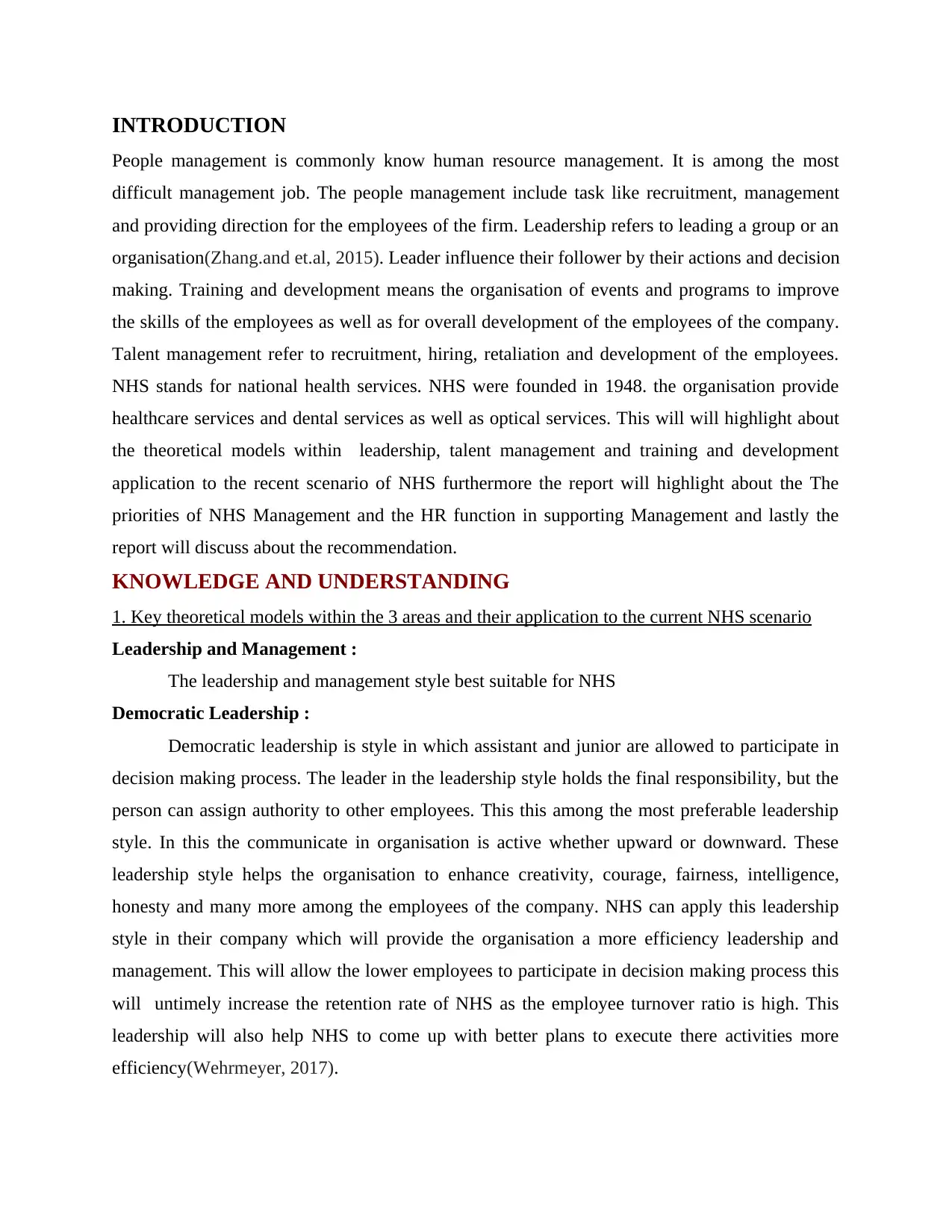
INTRODUCTION
People management is commonly know human resource management. It is among the most
difficult management job. The people management include task like recruitment, management
and providing direction for the employees of the firm. Leadership refers to leading a group or an
organisation(Zhang.and et.al, 2015). Leader influence their follower by their actions and decision
making. Training and development means the organisation of events and programs to improve
the skills of the employees as well as for overall development of the employees of the company.
Talent management refer to recruitment, hiring, retaliation and development of the employees.
NHS stands for national health services. NHS were founded in 1948. the organisation provide
healthcare services and dental services as well as optical services. This will will highlight about
the theoretical models within leadership, talent management and training and development
application to the recent scenario of NHS furthermore the report will highlight about the The
priorities of NHS Management and the HR function in supporting Management and lastly the
report will discuss about the recommendation.
KNOWLEDGE AND UNDERSTANDING
1. Key theoretical models within the 3 areas and their application to the current NHS scenario
Leadership and Management :
The leadership and management style best suitable for NHS
Democratic Leadership :
Democratic leadership is style in which assistant and junior are allowed to participate in
decision making process. The leader in the leadership style holds the final responsibility, but the
person can assign authority to other employees. This this among the most preferable leadership
style. In this the communicate in organisation is active whether upward or downward. These
leadership style helps the organisation to enhance creativity, courage, fairness, intelligence,
honesty and many more among the employees of the company. NHS can apply this leadership
style in their company which will provide the organisation a more efficiency leadership and
management. This will allow the lower employees to participate in decision making process this
will untimely increase the retention rate of NHS as the employee turnover ratio is high. This
leadership will also help NHS to come up with better plans to execute there activities more
efficiency(Wehrmeyer, 2017).
People management is commonly know human resource management. It is among the most
difficult management job. The people management include task like recruitment, management
and providing direction for the employees of the firm. Leadership refers to leading a group or an
organisation(Zhang.and et.al, 2015). Leader influence their follower by their actions and decision
making. Training and development means the organisation of events and programs to improve
the skills of the employees as well as for overall development of the employees of the company.
Talent management refer to recruitment, hiring, retaliation and development of the employees.
NHS stands for national health services. NHS were founded in 1948. the organisation provide
healthcare services and dental services as well as optical services. This will will highlight about
the theoretical models within leadership, talent management and training and development
application to the recent scenario of NHS furthermore the report will highlight about the The
priorities of NHS Management and the HR function in supporting Management and lastly the
report will discuss about the recommendation.
KNOWLEDGE AND UNDERSTANDING
1. Key theoretical models within the 3 areas and their application to the current NHS scenario
Leadership and Management :
The leadership and management style best suitable for NHS
Democratic Leadership :
Democratic leadership is style in which assistant and junior are allowed to participate in
decision making process. The leader in the leadership style holds the final responsibility, but the
person can assign authority to other employees. This this among the most preferable leadership
style. In this the communicate in organisation is active whether upward or downward. These
leadership style helps the organisation to enhance creativity, courage, fairness, intelligence,
honesty and many more among the employees of the company. NHS can apply this leadership
style in their company which will provide the organisation a more efficiency leadership and
management. This will allow the lower employees to participate in decision making process this
will untimely increase the retention rate of NHS as the employee turnover ratio is high. This
leadership will also help NHS to come up with better plans to execute there activities more
efficiency(Wehrmeyer, 2017).
⊘ This is a preview!⊘
Do you want full access?
Subscribe today to unlock all pages.

Trusted by 1+ million students worldwide
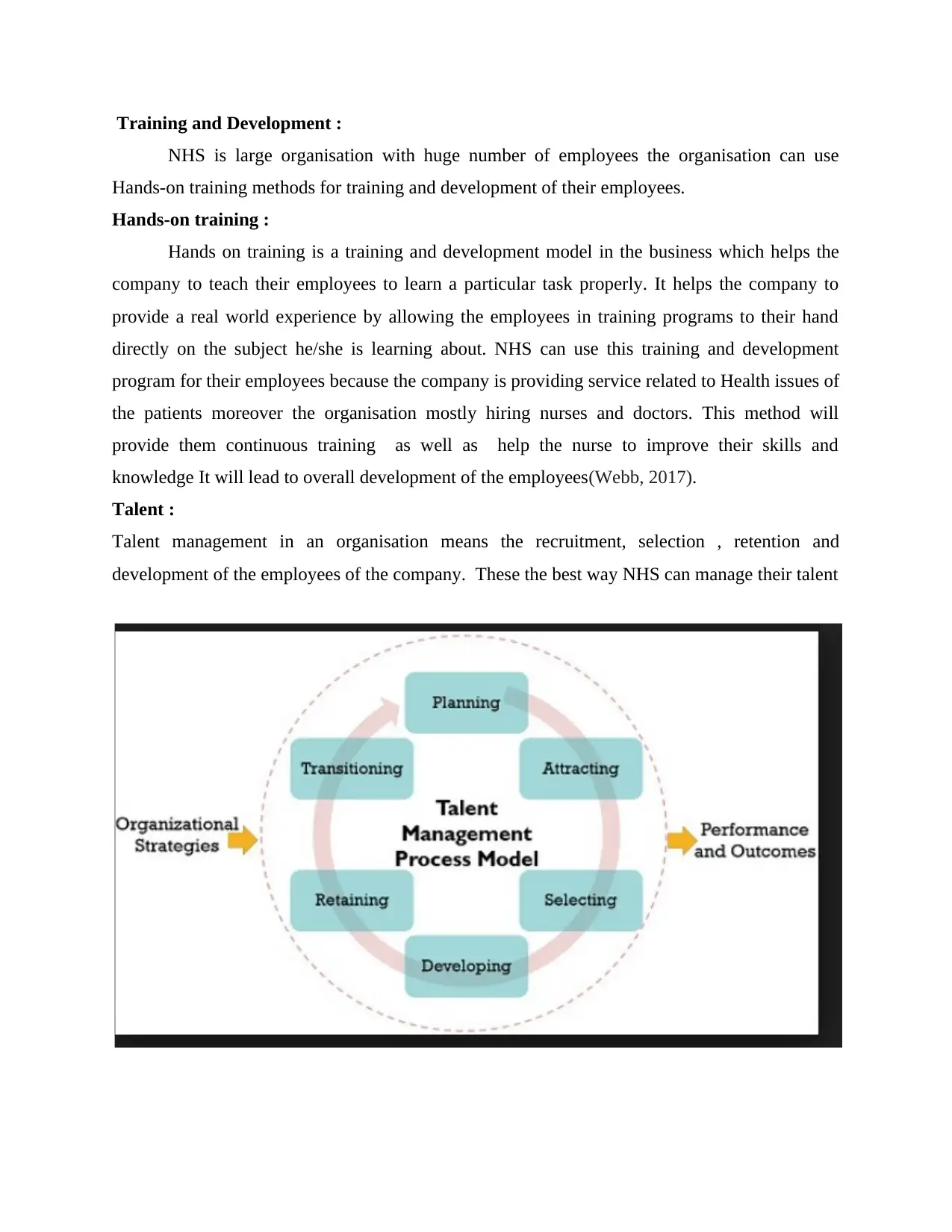
Training and Development :
NHS is large organisation with huge number of employees the organisation can use
Hands-on training methods for training and development of their employees.
Hands-on training :
Hands on training is a training and development model in the business which helps the
company to teach their employees to learn a particular task properly. It helps the company to
provide a real world experience by allowing the employees in training programs to their hand
directly on the subject he/she is learning about. NHS can use this training and development
program for their employees because the company is providing service related to Health issues of
the patients moreover the organisation mostly hiring nurses and doctors. This method will
provide them continuous training as well as help the nurse to improve their skills and
knowledge It will lead to overall development of the employees(Webb, 2017).
Talent :
Talent management in an organisation means the recruitment, selection , retention and
development of the employees of the company. These the best way NHS can manage their talent
NHS is large organisation with huge number of employees the organisation can use
Hands-on training methods for training and development of their employees.
Hands-on training :
Hands on training is a training and development model in the business which helps the
company to teach their employees to learn a particular task properly. It helps the company to
provide a real world experience by allowing the employees in training programs to their hand
directly on the subject he/she is learning about. NHS can use this training and development
program for their employees because the company is providing service related to Health issues of
the patients moreover the organisation mostly hiring nurses and doctors. This method will
provide them continuous training as well as help the nurse to improve their skills and
knowledge It will lead to overall development of the employees(Webb, 2017).
Talent :
Talent management in an organisation means the recruitment, selection , retention and
development of the employees of the company. These the best way NHS can manage their talent
Paraphrase This Document
Need a fresh take? Get an instant paraphrase of this document with our AI Paraphraser
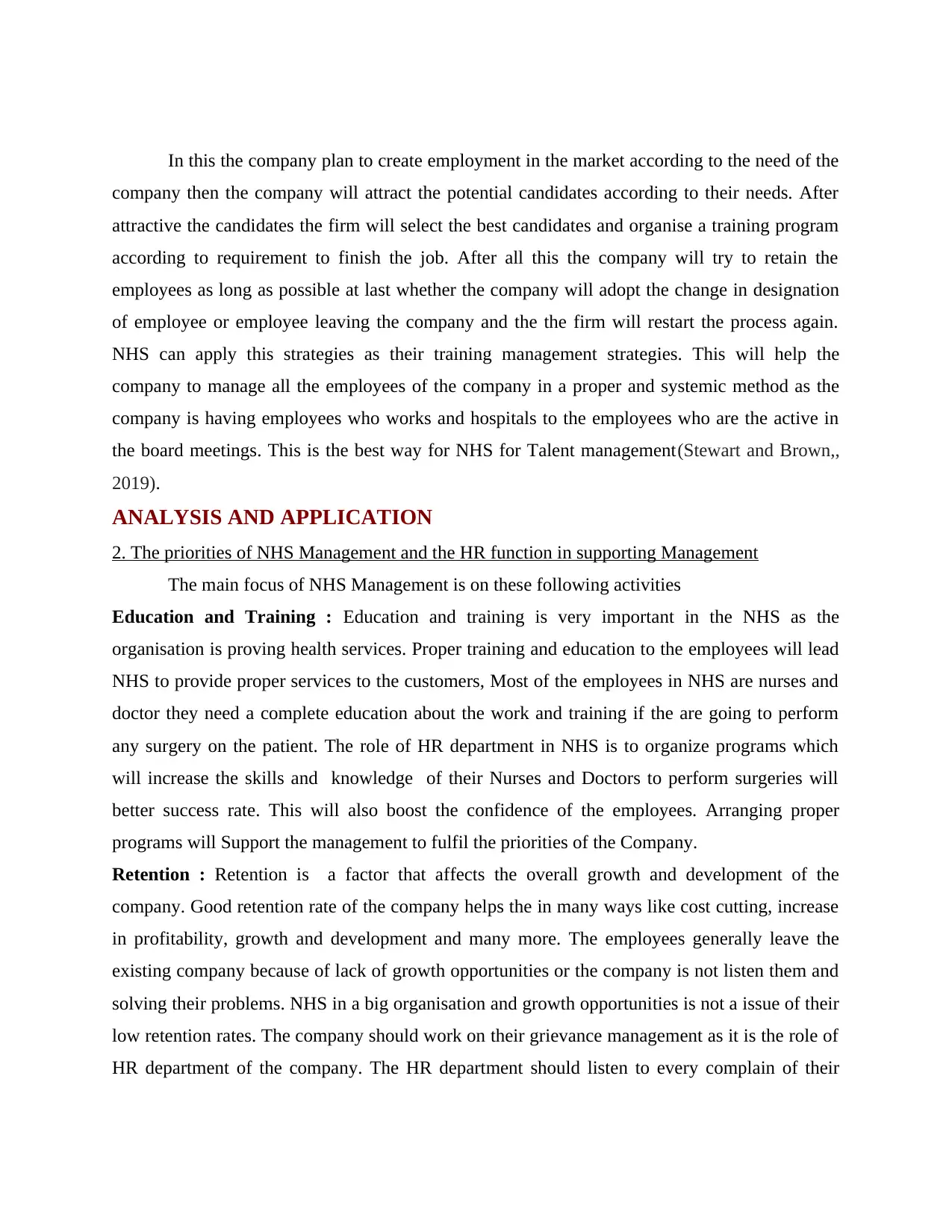
In this the company plan to create employment in the market according to the need of the
company then the company will attract the potential candidates according to their needs. After
attractive the candidates the firm will select the best candidates and organise a training program
according to requirement to finish the job. After all this the company will try to retain the
employees as long as possible at last whether the company will adopt the change in designation
of employee or employee leaving the company and the the firm will restart the process again.
NHS can apply this strategies as their training management strategies. This will help the
company to manage all the employees of the company in a proper and systemic method as the
company is having employees who works and hospitals to the employees who are the active in
the board meetings. This is the best way for NHS for Talent management(Stewart and Brown,,
2019).
ANALYSIS AND APPLICATION
2. The priorities of NHS Management and the HR function in supporting Management
The main focus of NHS Management is on these following activities
Education and Training : Education and training is very important in the NHS as the
organisation is proving health services. Proper training and education to the employees will lead
NHS to provide proper services to the customers, Most of the employees in NHS are nurses and
doctor they need a complete education about the work and training if the are going to perform
any surgery on the patient. The role of HR department in NHS is to organize programs which
will increase the skills and knowledge of their Nurses and Doctors to perform surgeries will
better success rate. This will also boost the confidence of the employees. Arranging proper
programs will Support the management to fulfil the priorities of the Company.
Retention : Retention is a factor that affects the overall growth and development of the
company. Good retention rate of the company helps the in many ways like cost cutting, increase
in profitability, growth and development and many more. The employees generally leave the
existing company because of lack of growth opportunities or the company is not listen them and
solving their problems. NHS in a big organisation and growth opportunities is not a issue of their
low retention rates. The company should work on their grievance management as it is the role of
HR department of the company. The HR department should listen to every complain of their
company then the company will attract the potential candidates according to their needs. After
attractive the candidates the firm will select the best candidates and organise a training program
according to requirement to finish the job. After all this the company will try to retain the
employees as long as possible at last whether the company will adopt the change in designation
of employee or employee leaving the company and the the firm will restart the process again.
NHS can apply this strategies as their training management strategies. This will help the
company to manage all the employees of the company in a proper and systemic method as the
company is having employees who works and hospitals to the employees who are the active in
the board meetings. This is the best way for NHS for Talent management(Stewart and Brown,,
2019).
ANALYSIS AND APPLICATION
2. The priorities of NHS Management and the HR function in supporting Management
The main focus of NHS Management is on these following activities
Education and Training : Education and training is very important in the NHS as the
organisation is proving health services. Proper training and education to the employees will lead
NHS to provide proper services to the customers, Most of the employees in NHS are nurses and
doctor they need a complete education about the work and training if the are going to perform
any surgery on the patient. The role of HR department in NHS is to organize programs which
will increase the skills and knowledge of their Nurses and Doctors to perform surgeries will
better success rate. This will also boost the confidence of the employees. Arranging proper
programs will Support the management to fulfil the priorities of the Company.
Retention : Retention is a factor that affects the overall growth and development of the
company. Good retention rate of the company helps the in many ways like cost cutting, increase
in profitability, growth and development and many more. The employees generally leave the
existing company because of lack of growth opportunities or the company is not listen them and
solving their problems. NHS in a big organisation and growth opportunities is not a issue of their
low retention rates. The company should work on their grievance management as it is the role of
HR department of the company. The HR department should listen to every complain of their
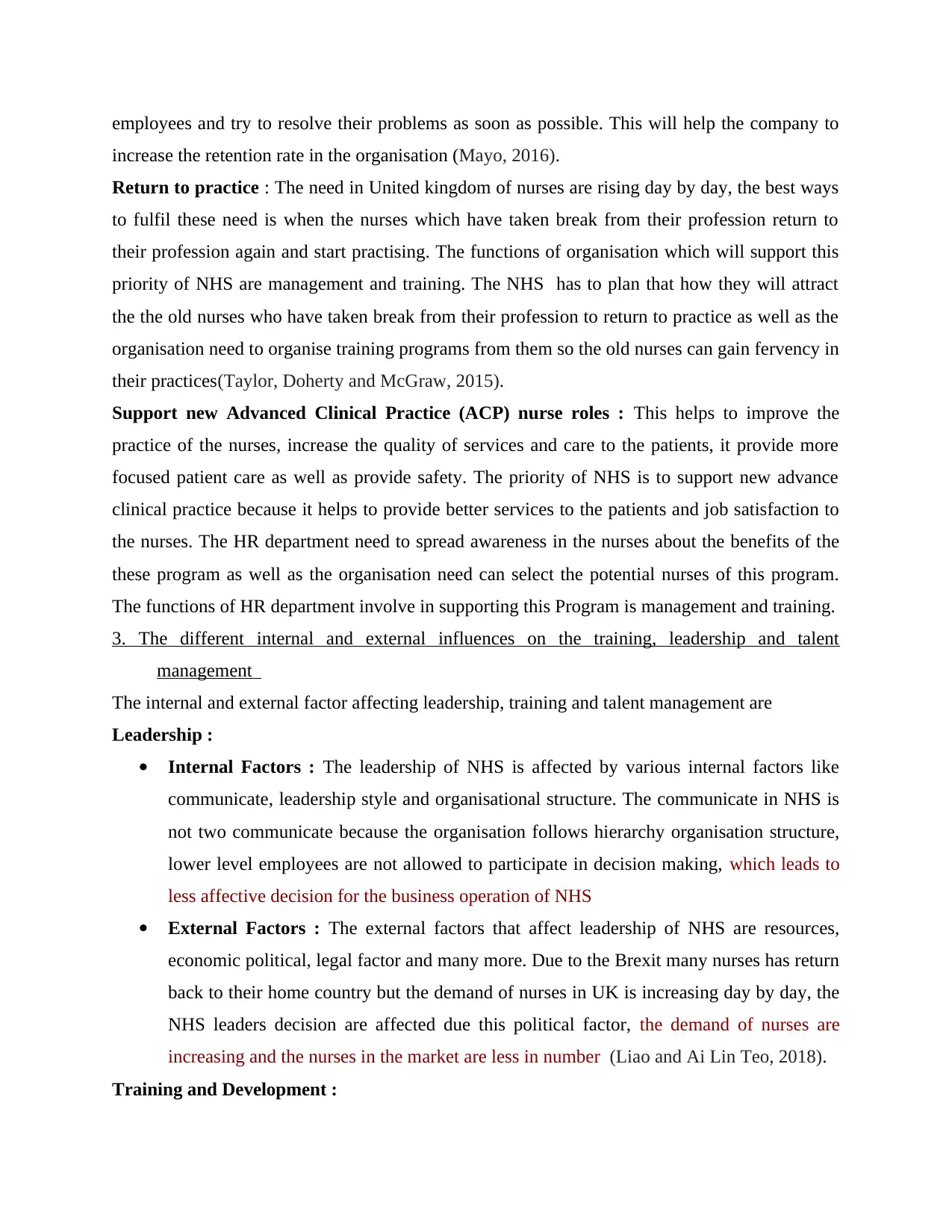
employees and try to resolve their problems as soon as possible. This will help the company to
increase the retention rate in the organisation (Mayo, 2016).
Return to practice : The need in United kingdom of nurses are rising day by day, the best ways
to fulfil these need is when the nurses which have taken break from their profession return to
their profession again and start practising. The functions of organisation which will support this
priority of NHS are management and training. The NHS has to plan that how they will attract
the the old nurses who have taken break from their profession to return to practice as well as the
organisation need to organise training programs from them so the old nurses can gain fervency in
their practices(Taylor, Doherty and McGraw, 2015).
Support new Advanced Clinical Practice (ACP) nurse roles : This helps to improve the
practice of the nurses, increase the quality of services and care to the patients, it provide more
focused patient care as well as provide safety. The priority of NHS is to support new advance
clinical practice because it helps to provide better services to the patients and job satisfaction to
the nurses. The HR department need to spread awareness in the nurses about the benefits of the
these program as well as the organisation need can select the potential nurses of this program.
The functions of HR department involve in supporting this Program is management and training.
3. The different internal and external influences on the training, leadership and talent
management
The internal and external factor affecting leadership, training and talent management are
Leadership :
Internal Factors : The leadership of NHS is affected by various internal factors like
communicate, leadership style and organisational structure. The communicate in NHS is
not two communicate because the organisation follows hierarchy organisation structure,
lower level employees are not allowed to participate in decision making, which leads to
less affective decision for the business operation of NHS
External Factors : The external factors that affect leadership of NHS are resources,
economic political, legal factor and many more. Due to the Brexit many nurses has return
back to their home country but the demand of nurses in UK is increasing day by day, the
NHS leaders decision are affected due this political factor, the demand of nurses are
increasing and the nurses in the market are less in number (Liao and Ai Lin Teo, 2018).
Training and Development :
increase the retention rate in the organisation (Mayo, 2016).
Return to practice : The need in United kingdom of nurses are rising day by day, the best ways
to fulfil these need is when the nurses which have taken break from their profession return to
their profession again and start practising. The functions of organisation which will support this
priority of NHS are management and training. The NHS has to plan that how they will attract
the the old nurses who have taken break from their profession to return to practice as well as the
organisation need to organise training programs from them so the old nurses can gain fervency in
their practices(Taylor, Doherty and McGraw, 2015).
Support new Advanced Clinical Practice (ACP) nurse roles : This helps to improve the
practice of the nurses, increase the quality of services and care to the patients, it provide more
focused patient care as well as provide safety. The priority of NHS is to support new advance
clinical practice because it helps to provide better services to the patients and job satisfaction to
the nurses. The HR department need to spread awareness in the nurses about the benefits of the
these program as well as the organisation need can select the potential nurses of this program.
The functions of HR department involve in supporting this Program is management and training.
3. The different internal and external influences on the training, leadership and talent
management
The internal and external factor affecting leadership, training and talent management are
Leadership :
Internal Factors : The leadership of NHS is affected by various internal factors like
communicate, leadership style and organisational structure. The communicate in NHS is
not two communicate because the organisation follows hierarchy organisation structure,
lower level employees are not allowed to participate in decision making, which leads to
less affective decision for the business operation of NHS
External Factors : The external factors that affect leadership of NHS are resources,
economic political, legal factor and many more. Due to the Brexit many nurses has return
back to their home country but the demand of nurses in UK is increasing day by day, the
NHS leaders decision are affected due this political factor, the demand of nurses are
increasing and the nurses in the market are less in number (Liao and Ai Lin Teo, 2018).
Training and Development :
⊘ This is a preview!⊘
Do you want full access?
Subscribe today to unlock all pages.

Trusted by 1+ million students worldwide
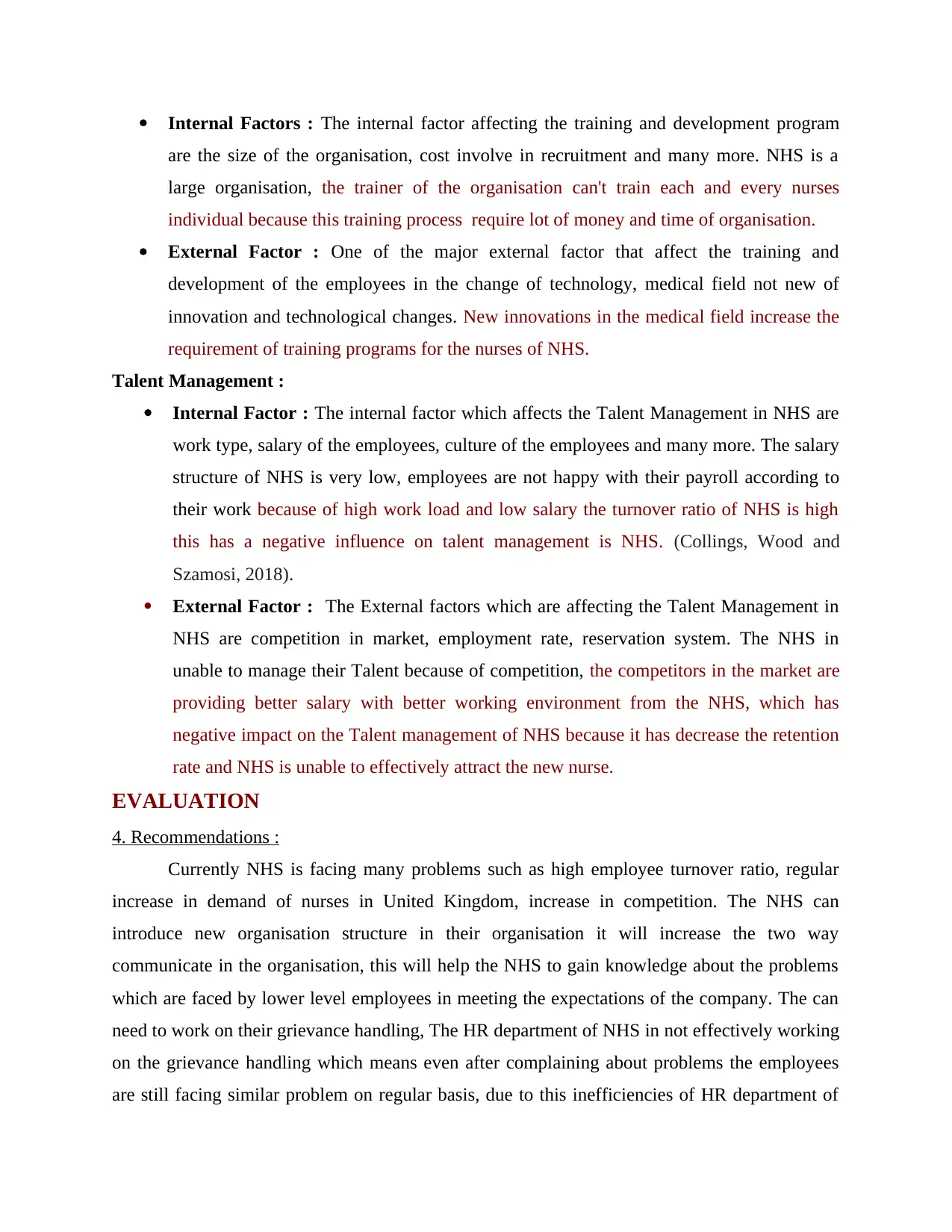
Internal Factors : The internal factor affecting the training and development program
are the size of the organisation, cost involve in recruitment and many more. NHS is a
large organisation, the trainer of the organisation can't train each and every nurses
individual because this training process require lot of money and time of organisation.
External Factor : One of the major external factor that affect the training and
development of the employees in the change of technology, medical field not new of
innovation and technological changes. New innovations in the medical field increase the
requirement of training programs for the nurses of NHS.
Talent Management :
Internal Factor : The internal factor which affects the Talent Management in NHS are
work type, salary of the employees, culture of the employees and many more. The salary
structure of NHS is very low, employees are not happy with their payroll according to
their work because of high work load and low salary the turnover ratio of NHS is high
this has a negative influence on talent management is NHS. (Collings, Wood and
Szamosi, 2018).
External Factor : The External factors which are affecting the Talent Management in
NHS are competition in market, employment rate, reservation system. The NHS in
unable to manage their Talent because of competition, the competitors in the market are
providing better salary with better working environment from the NHS, which has
negative impact on the Talent management of NHS because it has decrease the retention
rate and NHS is unable to effectively attract the new nurse.
EVALUATION
4. Recommendations :
Currently NHS is facing many problems such as high employee turnover ratio, regular
increase in demand of nurses in United Kingdom, increase in competition. The NHS can
introduce new organisation structure in their organisation it will increase the two way
communicate in the organisation, this will help the NHS to gain knowledge about the problems
which are faced by lower level employees in meeting the expectations of the company. The can
need to work on their grievance handling, The HR department of NHS in not effectively working
on the grievance handling which means even after complaining about problems the employees
are still facing similar problem on regular basis, due to this inefficiencies of HR department of
are the size of the organisation, cost involve in recruitment and many more. NHS is a
large organisation, the trainer of the organisation can't train each and every nurses
individual because this training process require lot of money and time of organisation.
External Factor : One of the major external factor that affect the training and
development of the employees in the change of technology, medical field not new of
innovation and technological changes. New innovations in the medical field increase the
requirement of training programs for the nurses of NHS.
Talent Management :
Internal Factor : The internal factor which affects the Talent Management in NHS are
work type, salary of the employees, culture of the employees and many more. The salary
structure of NHS is very low, employees are not happy with their payroll according to
their work because of high work load and low salary the turnover ratio of NHS is high
this has a negative influence on talent management is NHS. (Collings, Wood and
Szamosi, 2018).
External Factor : The External factors which are affecting the Talent Management in
NHS are competition in market, employment rate, reservation system. The NHS in
unable to manage their Talent because of competition, the competitors in the market are
providing better salary with better working environment from the NHS, which has
negative impact on the Talent management of NHS because it has decrease the retention
rate and NHS is unable to effectively attract the new nurse.
EVALUATION
4. Recommendations :
Currently NHS is facing many problems such as high employee turnover ratio, regular
increase in demand of nurses in United Kingdom, increase in competition. The NHS can
introduce new organisation structure in their organisation it will increase the two way
communicate in the organisation, this will help the NHS to gain knowledge about the problems
which are faced by lower level employees in meeting the expectations of the company. The can
need to work on their grievance handling, The HR department of NHS in not effectively working
on the grievance handling which means even after complaining about problems the employees
are still facing similar problem on regular basis, due to this inefficiencies of HR department of
Paraphrase This Document
Need a fresh take? Get an instant paraphrase of this document with our AI Paraphraser
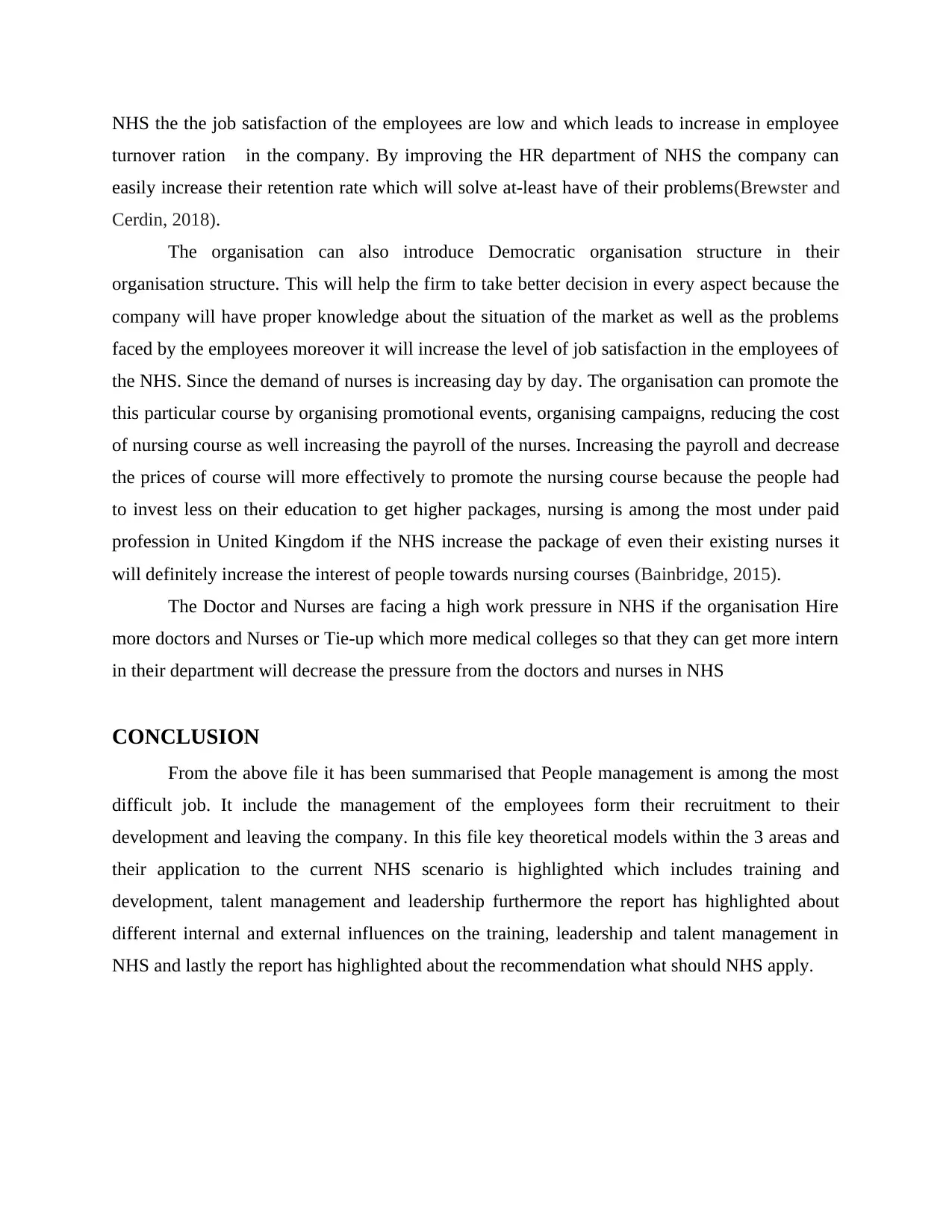
NHS the the job satisfaction of the employees are low and which leads to increase in employee
turnover ration in the company. By improving the HR department of NHS the company can
easily increase their retention rate which will solve at-least have of their problems(Brewster and
Cerdin, 2018).
The organisation can also introduce Democratic organisation structure in their
organisation structure. This will help the firm to take better decision in every aspect because the
company will have proper knowledge about the situation of the market as well as the problems
faced by the employees moreover it will increase the level of job satisfaction in the employees of
the NHS. Since the demand of nurses is increasing day by day. The organisation can promote the
this particular course by organising promotional events, organising campaigns, reducing the cost
of nursing course as well increasing the payroll of the nurses. Increasing the payroll and decrease
the prices of course will more effectively to promote the nursing course because the people had
to invest less on their education to get higher packages, nursing is among the most under paid
profession in United Kingdom if the NHS increase the package of even their existing nurses it
will definitely increase the interest of people towards nursing courses (Bainbridge, 2015).
The Doctor and Nurses are facing a high work pressure in NHS if the organisation Hire
more doctors and Nurses or Tie-up which more medical colleges so that they can get more intern
in their department will decrease the pressure from the doctors and nurses in NHS
CONCLUSION
From the above file it has been summarised that People management is among the most
difficult job. It include the management of the employees form their recruitment to their
development and leaving the company. In this file key theoretical models within the 3 areas and
their application to the current NHS scenario is highlighted which includes training and
development, talent management and leadership furthermore the report has highlighted about
different internal and external influences on the training, leadership and talent management in
NHS and lastly the report has highlighted about the recommendation what should NHS apply.
turnover ration in the company. By improving the HR department of NHS the company can
easily increase their retention rate which will solve at-least have of their problems(Brewster and
Cerdin, 2018).
The organisation can also introduce Democratic organisation structure in their
organisation structure. This will help the firm to take better decision in every aspect because the
company will have proper knowledge about the situation of the market as well as the problems
faced by the employees moreover it will increase the level of job satisfaction in the employees of
the NHS. Since the demand of nurses is increasing day by day. The organisation can promote the
this particular course by organising promotional events, organising campaigns, reducing the cost
of nursing course as well increasing the payroll of the nurses. Increasing the payroll and decrease
the prices of course will more effectively to promote the nursing course because the people had
to invest less on their education to get higher packages, nursing is among the most under paid
profession in United Kingdom if the NHS increase the package of even their existing nurses it
will definitely increase the interest of people towards nursing courses (Bainbridge, 2015).
The Doctor and Nurses are facing a high work pressure in NHS if the organisation Hire
more doctors and Nurses or Tie-up which more medical colleges so that they can get more intern
in their department will decrease the pressure from the doctors and nurses in NHS
CONCLUSION
From the above file it has been summarised that People management is among the most
difficult job. It include the management of the employees form their recruitment to their
development and leaving the company. In this file key theoretical models within the 3 areas and
their application to the current NHS scenario is highlighted which includes training and
development, talent management and leadership furthermore the report has highlighted about
different internal and external influences on the training, leadership and talent management in
NHS and lastly the report has highlighted about the recommendation what should NHS apply.
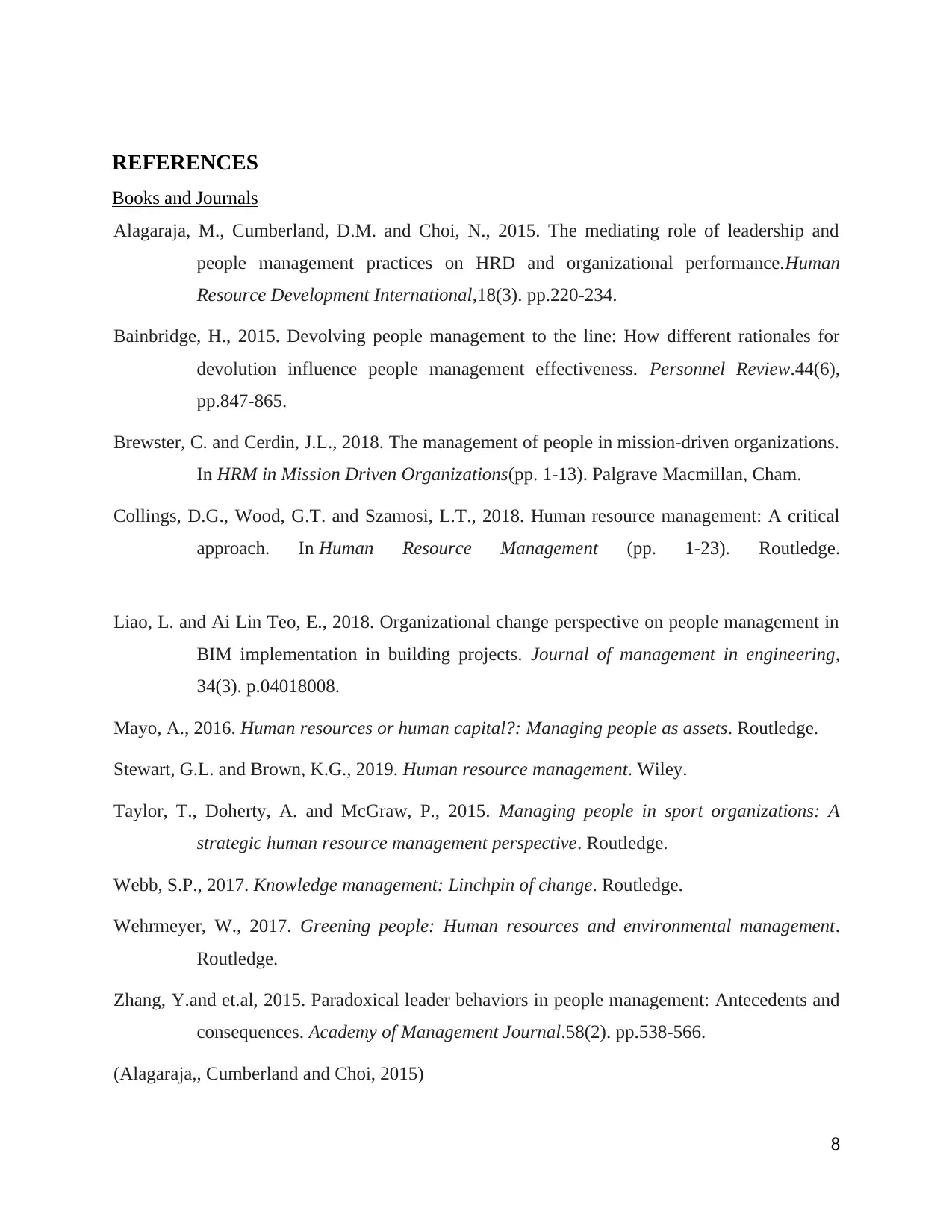
REFERENCES
Books and Journals
Alagaraja, M., Cumberland, D.M. and Choi, N., 2015. The mediating role of leadership and
people management practices on HRD and organizational performance.Human
Resource Development International,18(3). pp.220-234.
Bainbridge, H., 2015. Devolving people management to the line: How different rationales for
devolution influence people management effectiveness. Personnel Review.44(6),
pp.847-865.
Brewster, C. and Cerdin, J.L., 2018. The management of people in mission-driven organizations.
In HRM in Mission Driven Organizations(pp. 1-13). Palgrave Macmillan, Cham.
Collings, D.G., Wood, G.T. and Szamosi, L.T., 2018. Human resource management: A critical
approach. In Human Resource Management (pp. 1-23). Routledge.
Liao, L. and Ai Lin Teo, E., 2018. Organizational change perspective on people management in
BIM implementation in building projects. Journal of management in engineering,
34(3). p.04018008.
Mayo, A., 2016. Human resources or human capital?: Managing people as assets. Routledge.
Stewart, G.L. and Brown, K.G., 2019. Human resource management. Wiley.
Taylor, T., Doherty, A. and McGraw, P., 2015. Managing people in sport organizations: A
strategic human resource management perspective. Routledge.
Webb, S.P., 2017. Knowledge management: Linchpin of change. Routledge.
Wehrmeyer, W., 2017. Greening people: Human resources and environmental management.
Routledge.
Zhang, Y.and et.al, 2015. Paradoxical leader behaviors in people management: Antecedents and
consequences. Academy of Management Journal.58(2). pp.538-566.
(Alagaraja,, Cumberland and Choi, 2015)
8
Books and Journals
Alagaraja, M., Cumberland, D.M. and Choi, N., 2015. The mediating role of leadership and
people management practices on HRD and organizational performance.Human
Resource Development International,18(3). pp.220-234.
Bainbridge, H., 2015. Devolving people management to the line: How different rationales for
devolution influence people management effectiveness. Personnel Review.44(6),
pp.847-865.
Brewster, C. and Cerdin, J.L., 2018. The management of people in mission-driven organizations.
In HRM in Mission Driven Organizations(pp. 1-13). Palgrave Macmillan, Cham.
Collings, D.G., Wood, G.T. and Szamosi, L.T., 2018. Human resource management: A critical
approach. In Human Resource Management (pp. 1-23). Routledge.
Liao, L. and Ai Lin Teo, E., 2018. Organizational change perspective on people management in
BIM implementation in building projects. Journal of management in engineering,
34(3). p.04018008.
Mayo, A., 2016. Human resources or human capital?: Managing people as assets. Routledge.
Stewart, G.L. and Brown, K.G., 2019. Human resource management. Wiley.
Taylor, T., Doherty, A. and McGraw, P., 2015. Managing people in sport organizations: A
strategic human resource management perspective. Routledge.
Webb, S.P., 2017. Knowledge management: Linchpin of change. Routledge.
Wehrmeyer, W., 2017. Greening people: Human resources and environmental management.
Routledge.
Zhang, Y.and et.al, 2015. Paradoxical leader behaviors in people management: Antecedents and
consequences. Academy of Management Journal.58(2). pp.538-566.
(Alagaraja,, Cumberland and Choi, 2015)
8
⊘ This is a preview!⊘
Do you want full access?
Subscribe today to unlock all pages.

Trusted by 1+ million students worldwide

9
1 out of 10
Related Documents
Your All-in-One AI-Powered Toolkit for Academic Success.
+13062052269
info@desklib.com
Available 24*7 on WhatsApp / Email
![[object Object]](/_next/static/media/star-bottom.7253800d.svg)
Unlock your academic potential
Copyright © 2020–2026 A2Z Services. All Rights Reserved. Developed and managed by ZUCOL.




